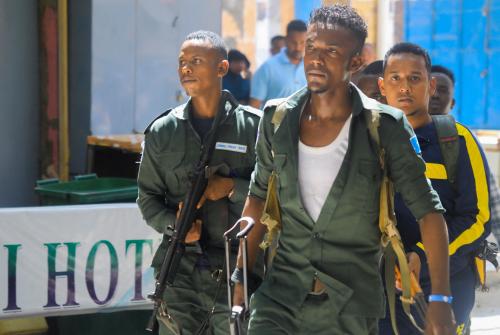Throughout the 1990s, the United States has responded to acts of terrorism using only very limited means.
After Iraqi efforts to assassinate former President George H.W. Bush and after previous strikes by the Osama bin Laden organization, the United States responded by launching cruise missiles that fly slowly and cannot easily attack mobile targets.
The primary purpose of these counterattacks was to show resolve and make a symbolic statement against terrorism while minimizing the risks of causing American military casualties and of provoking additional terrorist strikes.
This time, the response of the United States must be much firmer and much different.
President Bush has wisely stated that the United States will make no distinction between the terrorists who brutally killed thousands of innocents Tuesday and any states harboring them.
Most likely, he is thinking of Mr. bin Laden’s al Qaeda terrorist network as the actual perpetrator of the attack and the Taliban in Afghanistan as the government providing sanctuary to this brutal, heartless man and his followers. Mr. Bush is surely right that both groups, if indeed found to be guilty as suspected, must be punished.
However, punishment will mean little if confined to symbolic missile strikes and the tightening of economic pressure on the already heavily sanctioned Taliban regime. Sterner measures are needed.
There are major risks in implementing any such measures. But there are even greater risks in leaving the perpetrators of these attacks in place, given bin Laden’s deep hatred of the United States and his determination to attack U.S. interests until our military forces leave the Persian Gulf.
Since we cannot and will not leave the gulf, future deadly attacks against the United States are likely unless his organization is dramatically weakened.
It would be tempting to consider a Kosovo-style coercive bombing campaign against the Taliban until it turned Mr. bin Laden over and expelled his organization from Afghanistan. But such a campaign would have few substantial targets in that war-ravaged and underdeveloped country. Moreover, it would surely kill many Afghans.
The United States and any willing allies could consider launching a ground war against the Taliban to overthrow it and seize Mr. bin Laden and his top lieutenants.
That approach, patterned on the operations against Germany and Japan in World War II, would bring peace to Afghanistan and perhaps contribute indirectly to stabilizing Pakistan and South Asia. It could work, albeit at a cost of hundreds or thousands of American casualties.
But there is a chance it would fail, given the difficulty of the Afghan terrain and the resilience of its fighters (witness the Soviet experience there in the 1980s). Also, there’s the possibility that no neighboring state would permit the United States to launch a ground war from its territory.
That leaves two options.
One is to prepare a commando strike to seize Mr. bin Laden when the opportunity presents itself. Putting him on trial would be the most proportional and desirable response. But it would require knowing his whereabouts.
A second option would be to provide weapons and technical assistance to the Afghan resistance.
But the Afghan resistance is weak, controlling only 5 percent of the country, and its top leader, Ahmad Shah Massoud, recently was targeted for assassination.
Experience from Nicaragua to Bosnia to Iraq shows that this option requires patience. But it can yield results. In this case, it could be coupled with the use of U.S. tactical air power, if we were willing to violate a regional country’s airspace or if countries like Russia and Tajikistan cooperated.
The United States could also consider escalation to a limited ground option involving American troops if future conditions were favorable.
The key point is that we cannot use a limited dose of force just to send a message. That approach has been tried and failed. Generally, the only message sent is one of irresoluteness. And it leaves the bin Ladens of the world free to strike again.



Commentary
Op-edSymbolic Missile Strikes Won’t Work; We Need Sterner Measures
September 14, 2001